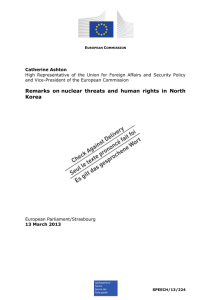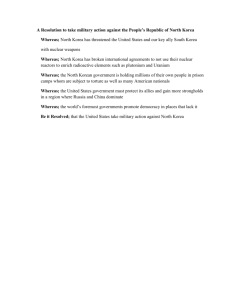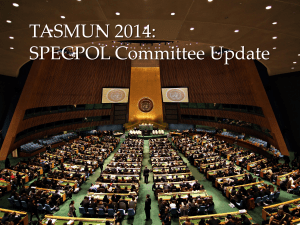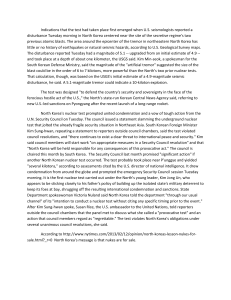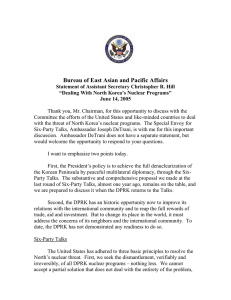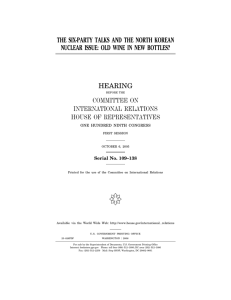1st Disarmament and International Security Committee (DISEC
advertisement
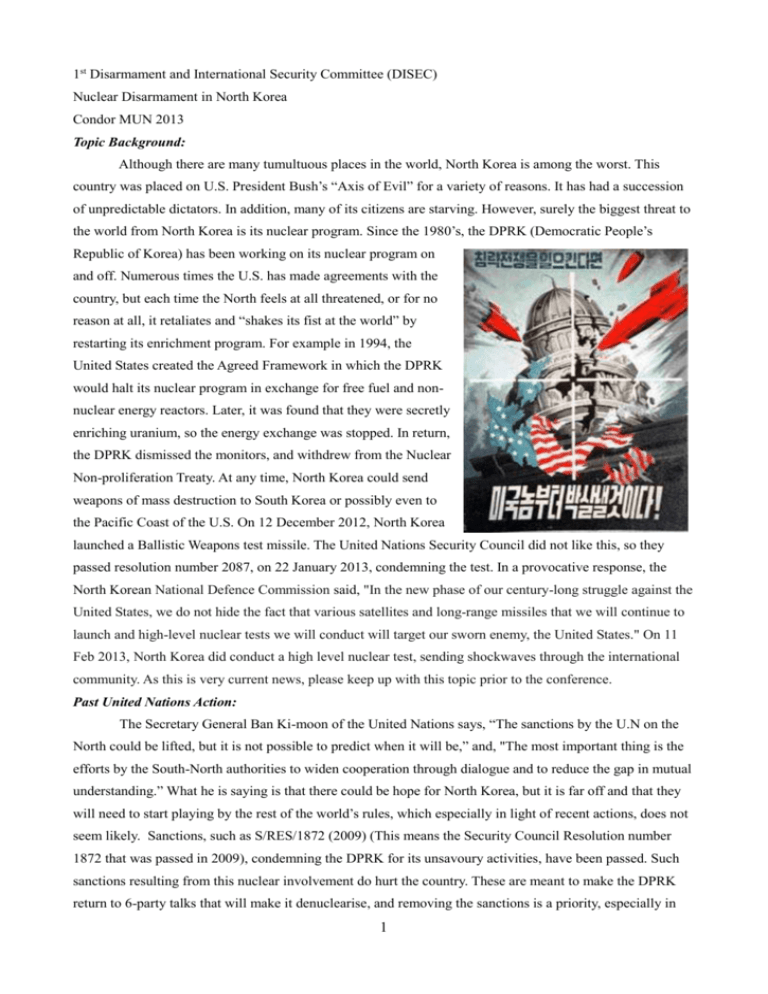
1st Disarmament and International Security Committee (DISEC) Nuclear Disarmament in North Korea Condor MUN 2013 Topic Background: Although there are many tumultuous places in the world, North Korea is among the worst. This country was placed on U.S. President Bush’s “Axis of Evil” for a variety of reasons. It has had a succession of unpredictable dictators. In addition, many of its citizens are starving. However, surely the biggest threat to the world from North Korea is its nuclear program. Since the 1980’s, the DPRK (Democratic People’s Republic of Korea) has been working on its nuclear program on and off. Numerous times the U.S. has made agreements with the country, but each time the North feels at all threatened, or for no reason at all, it retaliates and “shakes its fist at the world” by restarting its enrichment program. For example in 1994, the United States created the Agreed Framework in which the DPRK would halt its nuclear program in exchange for free fuel and nonnuclear energy reactors. Later, it was found that they were secretly enriching uranium, so the energy exchange was stopped. In return, the DPRK dismissed the monitors, and withdrew from the Nuclear Non-proliferation Treaty. At any time, North Korea could send weapons of mass destruction to South Korea or possibly even to the Pacific Coast of the U.S. On 12 December 2012, North Korea launched a Ballistic Weapons test missile. The United Nations Security Council did not like this, so they passed resolution number 2087, on 22 January 2013, condemning the test. In a provocative response, the North Korean National Defence Commission said, "In the new phase of our century-long struggle against the United States, we do not hide the fact that various satellites and long-range missiles that we will continue to launch and high-level nuclear tests we will conduct will target our sworn enemy, the United States." On 11 Feb 2013, North Korea did conduct a high level nuclear test, sending shockwaves through the international community. As this is very current news, please keep up with this topic prior to the conference. Past United Nations Action: The Secretary General Ban Ki-moon of the United Nations says, “The sanctions by the U.N on the North could be lifted, but it is not possible to predict when it will be,” and, "The most important thing is the efforts by the South-North authorities to widen cooperation through dialogue and to reduce the gap in mutual understanding.” What he is saying is that there could be hope for North Korea, but it is far off and that they will need to start playing by the rest of the world’s rules, which especially in light of recent actions, does not seem likely. Sanctions, such as S/RES/1872 (2009) (This means the Security Council Resolution number 1872 that was passed in 2009), condemning the DPRK for its unsavoury activities, have been passed. Such sanctions resulting from this nuclear involvement do hurt the country. These are meant to make the DPRK return to 6-party talks that will make it denuclearise, and removing the sanctions is a priority, especially in 1 the new regime. Unfortunately these six party talks may not take place again, for the elimination of the DPRK’s nuclear and uranium enrichment programs must preclude negotiation, along with outside regulation, namely by the International Atomic Energy Agency (IAEA – UN Agency). This makes for a vicious circle of tension between States. The six parties in these talks are the U. S., Russia, China, Japan, North and South Korea; however the North wants to talk to the U. S. one on one only. Once in a while the U. S. does indulge the DPRK's desires, but they always expect the DPRK to open itself to further, more open talks. Not surprisingly, the DPRK refuses to accept this and even realises some of the other countries as threats, save China, who is giving them aid and is one of their major allies. As long as China continues to provide aid, North Korea can probably sustain its current actions. Possible Solutions to explore: Possible solutions include being more aggressive in providing humanitarian aid and lifting many sanctions off North Korea. This would possibly have a chance at raising the standard of living and welfare of the general North Korean population. Most would say that this would not solve the problem effectively though, because they would likely imprison, as they have already, any who come in their country to give aid without permission. If sanctions are lifted, all extra support that the country receives would be directed to the military most likely. However, cutting off all aid would result in a still bad situation for the people, but the military would not get as much support either. On the positive side though would be that although this is not a resolution to the problem, it provides a means by which further military efforts would be reduced as long as the aid-talk based plan is continued. Another possible solution is to drastically cut off every tie North Korea has in the world, by increasing sanctions and denying any sort of aid or discussion whatsoever. With a strict denial of dignity in international affairs, it is thought that the North Korean government would have nowhere else to go but to give up and submit to the will of the international community. However, keep in mind though if this course of action is to be explored, the DPRK may become irritated with continuous refusal of aid and talks by other countries, such as the United States, will only increase its aggressiveness. What to expect: Basically, your job at this conference will be balancing the humanitarian side of the issue with the need to crack down on North Korea with additional sanctions. I would like the debate of the conference to focus on the longer term solutions rather than short term military solutions better suited to the Security Council. Note also that as the 1st DISEC, you do not have the power to actually impose sanctions on the Democratic People's Republic of Korea, only 'suggest' them to the Security Council. Furthermore, be aware that the DPRK will be a present and active force in committee. When considering who to work with in your caucus groups, follow a regional guideline (for example, Peru would work with other South American countries). Virtually all countries with the exception of China and a few Middle-Eastern and African countries have general agreement over possible solutions to the problem. I wish you luck in searching for solutions to this grave problem and look forward to seeing you and your original, practical solutions at our conference. 2 Works Cited These sources are either what I consulted in my research or are generally helpful links and it would benefit you to begin your research with these sources. In your papers, please include at least four sources not listed here. Breen, Michael. Kim Jong-Il North Korea's Dear Leader. Singapore: John Wiley & Sons (Asia), 2004. Print. Hla Tun, Aung. "North Korea seeking rice deal with Myanmar ." Reuters 12 Aug. 2011. Web. Melvin, Curtis. "The secret world of North Korea’s new rich." North Korea Economy Watch 09 Aug. 2011. n. pag. Web. 12 Aug 2011. Smith, Robert, and Zoe Chace, auth. "Drug Dealing, Counterfeiting, Smuggling: How North Korea Makes Money." All Things Considered. NPR, 11 Aug. 2011. Web. 12 Aug 2011. "U.N. Chief Says North Korea Sanctions Should Remain ." Global Security Newswire 12 Aug. 2011. n. pag. Web. 12 Aug 2011. UN Security Council. “S/RES/1718.” 2006. Web. 12 Feb 2012. UN Security Council. “S/RES/1874.” 2009. Web. 12 Feb 2012. UN Security Council. “S/RES/2087.” 2013. Web. 10 Feb 2013. Brumfiel, Geof. “Isotopes hint at North Korean nuclear test.” Nature. Web. 12 Feb 2012. Sang-Hun, Choe. “New Study Points to Unknown Nuclear Tests by North Korea in 2010.” International Herald Tribune. 12 Feb 2012. Web. 12 Feb 2012. http://www.cbc.ca/news/world/story/2011/07/07/nuclear-pakistan-nkorea.html http://in.reuters.com/article/2011/09/18/idINIndia-59404120110918 http://news.bbc.co.uk/2/hi/europe/2645741.stm http://topics.nytimes.com/top/news/international/countriesandterritories/northkorea/nuclear_program/index.html http://english.cri.cn/6966/2013/02/13/191s748179.htm 3
